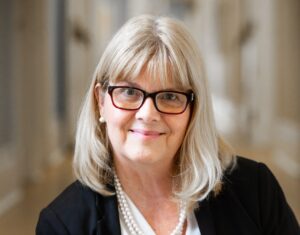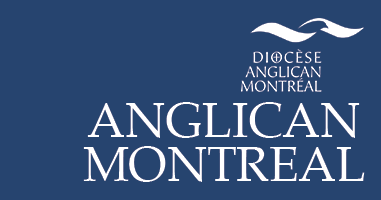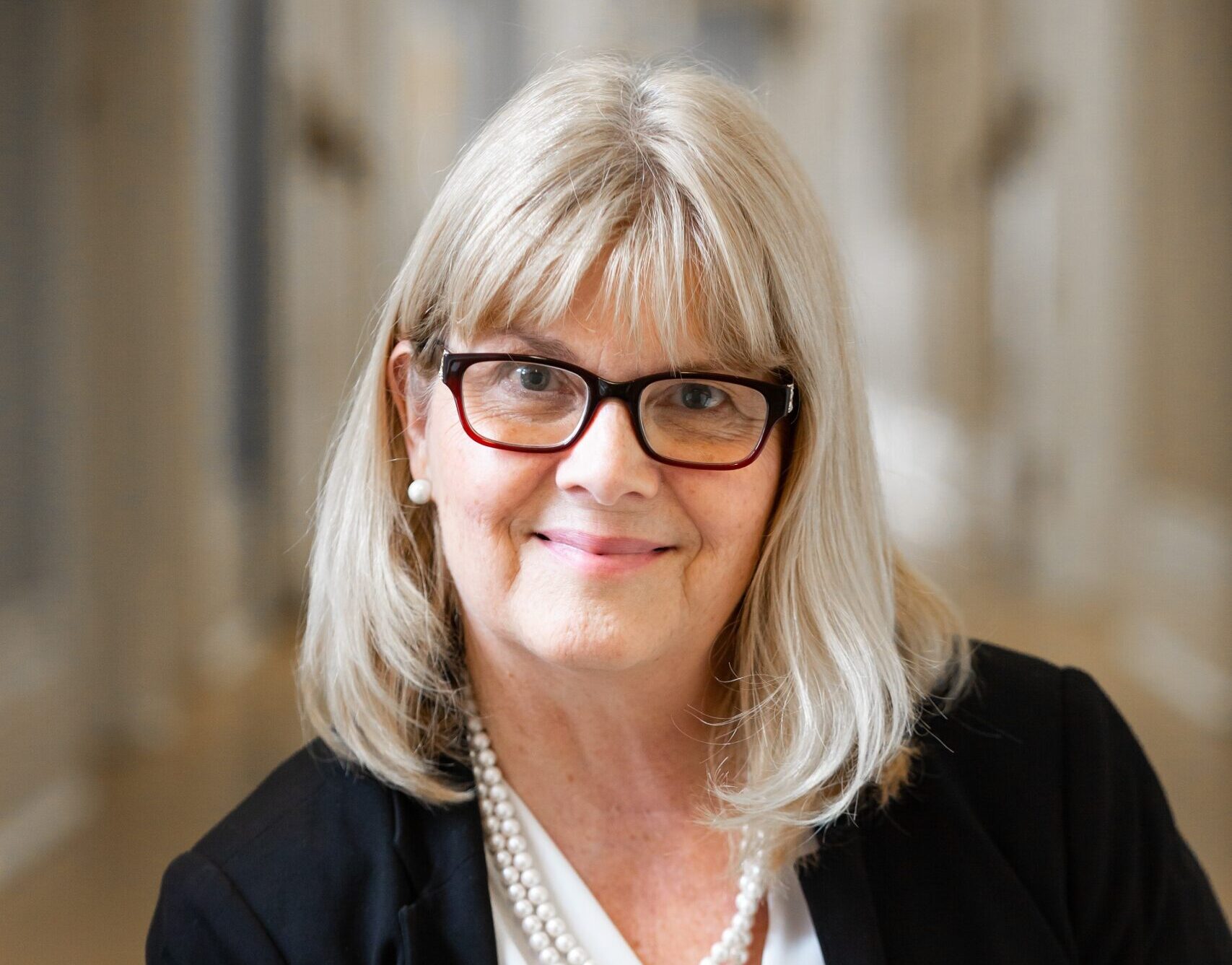For the 2nd year our annual diocesan Synod met virtually. And if it seems as if Synod came quickly this year – you’re right. Because of the uncertainty around the pandemic, last year’s Synod was moved from May to November. So it is impressive that the Synod Planning Committee was able to orchestrate this Conference Synod – made more challenging by virtue of being virtual – in such a short period of time. It all went as planned, on schedule with only minor virtual hiccups.
The Bishop’s Charge
Following the opening worship Bishop Mary delivered her Charge in which she was honest about the challenges of the past year and the future of our diocese in post-pandemic times. Yet she also expressed abundant hope; “I believe that we stand on the threshold of some exciting possibilities in ministry; this is a chance to launch into greater cooperation with God. Let us celebrate God at work! Let us listen closely for his guidance and step out boldly.” She also acknowledged the need for change; “Don’t stop changing and don’t try to go back to where you once felt safe. ”
For the complete charge go to www.anglican.montreal.ca/synod.
Judy Paulsen on Evangelism
Following the delivery of her charge, Bishop Mary introduced the Rev Canon Dr Judy Paulsen, a Professor of Evangelism and Director of the Institute of Evangelism at Wycliffe. In addition to teaching evangelism she works with churches to help them cultivate a culture of “disciples making disciples”.
For the third year, the theme of Synod has been evangelism. Specifically for this year it was “The Challenges of Evangelism: how do we invite people?”
Judy posed the provocative question of “How do we proclaim Christ in a world that seems disinterested?” And, “Who is the disinterested world that we hope to share with?”
Citing research from the Angus Reid Institute (https://angusreid.org/religion-in-canada-150/) she attempted to provide a roadmap for the first question and some clarity for the second.
The survey of Canadians in 2017 revealed the following segments of population in terms of views towards religion:
21% are religiously committed (14% in Quebec)
30% are privately faithful (32% in Quebec)
30% are spiritually uncertain (36% in Quebec)
19% are non-believers (18% in Quebec)
With the state of decline in church attendance, and the rise of the two middle groups (the privately faithful and spiritually uncertain) the big question that arises from these statistics is; Is this a crisis or an opportunity? You will notice that these two groups are even larger in Quebec, representing 68% of the population. The comments in the chat during Judy’s presentation revealed that most agreed, this is an opportunity.
If you would like to dive into the details of the study (The Angus Reid spectrum of spirituality) I would encourage you to visit the website https://angusreid.org/religion-in-canada-150.
Takeaways from the Research
It is clear from the research that most Quebecers have faith to varying degrees – few (18%) reject it entirely, which means that Quebecers are less hostile to religion than attendance might imply. The privately faithful, especially, are very interested in questions of faith, and while they believe in God and pray, they don’t read the scriptures or attend services. Yet, the majority of the privately faithful want their kids to be formally welcomed into a religious community.
While many of the surveyed see religion’s overall impact as negative and half feel uncomfortable around the devoutly faithful, the majority wish they had a closer relationship with God. For everyone- across all groups –the least positive words (from a list that includes the words karma, morality, religion and salvation) are theology and evangelism.
One thing is certain, the new reality that these statistics reveal requires us to do some changing. The other thing that is certain is “people like change, but they don’t like to change”.
Time for Change
How do we equip the church for change? Judy suggests that it starts with praying for the privately faithful and spiritually uncertain to come to Christ and trusting that Jesus still calls people to Himself and that God give us a passion to share the faith we have.
Additionally, Judy challenged us to try some experiments to share our faith with people in these groups who we already have in our lives. In particular, she encouraged us to try the Bible Study Project – Invite someone you know with no church connection to read and discuss together 3 stories from the earliest biographies of Jesus’ life. Judy has been challenging people to try this for years and out of the more than 200 who have tried, only one was turned down by the first person he or she asked. This is an opportunity for the spiritually uncertain and privately faithful to ask those questions and get closer to God.
There are also ways to help people you don’t yet know to feel more comfortable around people of faith. Think of opportunities to engage your community by offering fun or educational events. Have a picnic or concert open to the public. Offer programs such as financial seminars, Griefshare and Divorce Care. Try a book club. Most people also welcome opportunities to volunteer. How about asking for volunteers from the community while the “regulars” are there for friendly conversation and trust building?
And remember the children. We have learned that for many Christian education is a vital foundation for faith.
Don’t get trapped into thinking that the problem is too big for our church. We should remember secularism is a public reaction but doesn’t show what is in peoples’ hearts. Evangelism can be scary but it can also be rewarding. You may find that talking about faith is energizing and joyful.
In addition to the Keynote speaker, there were several conference workshops for attendees to choose from:
Conference Workshops
The Importance of Context: Dr Glen Smith, Presbyterian College
Rethinking Evangelism: Dr Dominic Ruso
Lessons Learned from A New Community: The Rev Graham Singh and Ms Marney Matoga
Emerging Conversations: Ms Lee-Ann Matthews & Mr Andrew Rennie
Lessons from Children and Youth Ministries at the Church of St Mark & St Peter: Ms. June Lashley & Diana Keener
Ministry to Children: The Rev Grace Burson
Ministry to Young Adults: The Rev Jean-Daniel O’Donncada
Le ministère dans le Québec multiculturel: Mr Mark Gibson & Fr Thomas Ntilivamunda
Finance Presentation
Ron O’Connell, the Diocesan Treasurer, had recorded his finance presentation earlier in the week. It is available online at www.montreal.anglican.ca/Synod. Mr O’Connell encouraged everyone to review the report created by Diocesan Finance Manager Mr Stephen Tam. It is on page 92 of the Convening Circular which can be found online at the same address.
Mr O’Connell was frank about the losses the Diocese incurred last year. The Diocese stopped taking assessments from parishes in 2nd quarter of 2020, paid clergy salaries in the early days of the pandemic before the government support kicked in and lost revenue from investments. These circumstances resulted in a loss of $1.8 million for 2020. The diocese covered the losses through the use of investments, cash on hand, sale of a property and line of credit. While we are fortunate to have these options, the continued drawing down of our funds will make it more challenging to cover deficits in coming years.
The projected loss for 2021 is $670k. However, since this projection was prepared it was announced that the government might extend the wage subsidy until the end of September. If so, the Diocese may continue to suspend assessments. If Synod approves the continued suspension of the assessments then the loss for 2021 will be over $1 million.
There was discussion about the details of the wage subsidy policy. Mr Tam explained that if we charge parishes for assessments and don’t collect them, it is still considered income and would affect our ability to receive the wage subsidy.
It was suggested that parishes would benefit from a discussion on “dreaming big” and alternative models of doing church and using resources. Diocesan Council will pursue this suggestion at its next meeting in June.
The Board of Trustees of the Anglican Balanced Fund has been researching and interviewing Investment firms and will announce a new investment manager soon.
Results of Elections
Lay Secretary of Synod – Ms Valerie Taylor
Clerical Secretary of Synod – Rev Sophie Rolland
Diocesan Treasurer – Mr Ron O’Connell
Diocesan Council Members:
Clergy
Rev Grace Burson
Rev Nicholas Forte
Rev Tania Lesack
Lay
Ms Nancy Greene-Gregoire
Ms Danica Meredith
Ms Susan Winn
General Synod clerical delegates:
Ven Dr Victor-David Mbuyi-Bipungu
Rev Canon Dr Jesse Zink
Alternates:
Rev Amy Hamilton
Rev Tyson Rosberg
General Synod lay delegates:
Mr Dion Lewis
Ms Susan Winn
Alternates
Mr Randy Gates
Ms Nancy Greene-Gregoire
Youth Delegate
Ms Eden Mancor
Members’ Forum
Following the Finance presentation we heard from the following:
The Rev Gwenda Wells, our Diocesan Representative to the Anglican Foundation, shared a video from the Foundation and introduced the new initiative supporting youth programs: Say Yes to Kids. For more on this see page 5.
Dion Lewis, Co-chair of the Anti Black Racism Task Force, gave an update on this working group’s efforts, including a series of seminars happening this fall. For more on the task force see page 9 for Edward Yankee’s article. Their report can be found at www.anglican.montreal.ca/synod.
If you would like to know more about the Anit Black Racism Task Force, email [email protected].
The Rev Canon Dr Neil Mancor encouraged everyone to participate in the latest project from Primate Linda Nichols called Share your Spark.
Our next Synod with an emphasis on Anti-racism will be held on June 18, 2022. In person, God willing.



